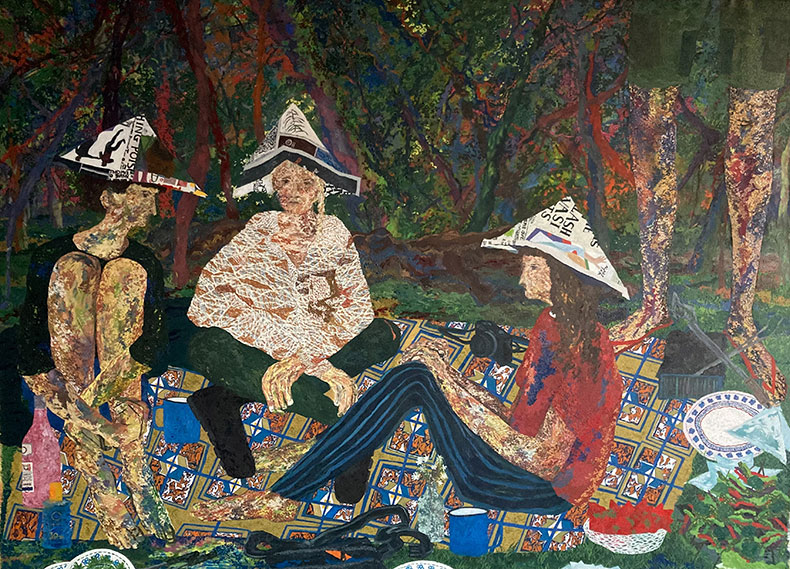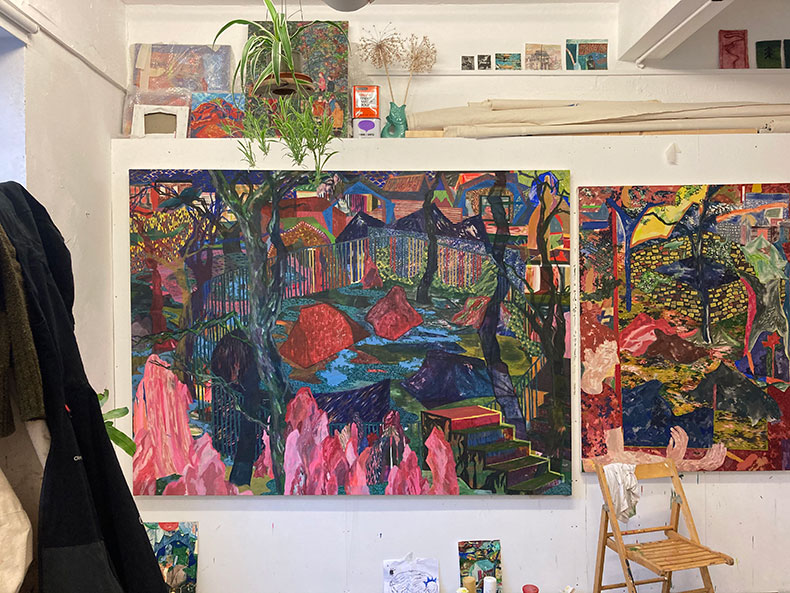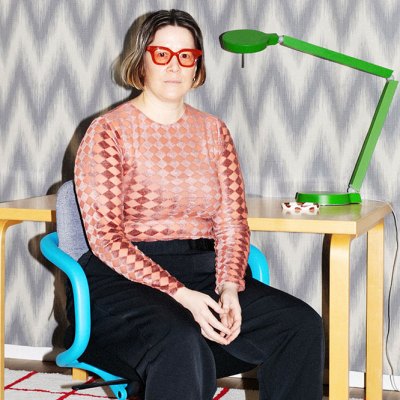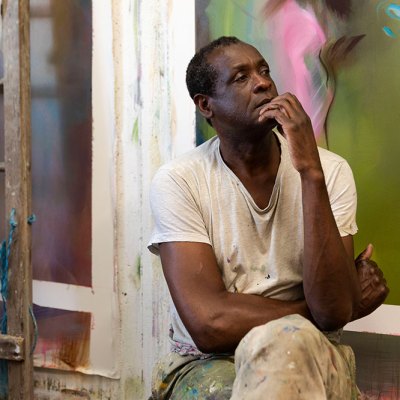The London-based artist draws inspiration from her local surroundings to create dense, vividly coloured compositions that explore the ways in which nature flourishes within urban spaces. In 2021, she was the recipient of the prestigious John Moores Painting Prize (previous winners include Peter Doig, Rose Wylie and David Hockney) for a two-metre-square painting titled ‘The Common’, which is on permanent display at the Walker Art Gallery in Liverpool where she has a solo exhibition from 11 February to 30 April.
Where is your studio?
It’s in Forest Hill in south London. It’s not a very inspiring studio because it’s an ex-office building, but I can walk there from my flat, which is really wonderful and it’s got quite a bit of storage space.
Are there other artists in the building?
Yes, quite a few actually. I share the studio with my partner, Alison, who makes sound art. Across the way there’s a lady who makes things out of papier-mâché. For a while there were drag queens from RuPaul’s Drag Race next door and I think there’s a fashion designer below us so quite an eclectic mix of people, which is nice.
Paper Hats (2022), Kathryn Maple. Courtesy the artist

Do you have a specific studio routine?
I feel very lucky to be able to make art every day with the odd bit of teaching. So, I normally walk to the studio at around half past eight with my Jack Russell, Mary, and we’re here until about six. I like that the walk from my flat gets the blood going a bit in the morning, but when I’m in, I like to get going straight away. It has been a bit of a strange month because everything I had been working on over the past two years was suddenly gone and coming [into the studio] was a bit like arriving into an empty shell, but there are a few things back up on the wall again now.
Is most of your time spent painting?
Yes. I tend to have quite a few paintings on the go at once so I’m often moving between works, but I do try to find ways of breaking repetition perhaps changing how I use the paintbrush or using collage. I find different kinds of actions quite useful [for my practice]. Last year, I did a drawing a day for a year – they are being exhibited in London in March. I would go out at lunch time and do a drawing outside. It’s good to get some fresh air and the lighting is a bit strange in the studio – I sometimes feel a bit like I’m at the bottom of a tropical fish tank.
A lot of the ideas for my paintings come from the things I see on walks and in the local neighbourhood. You never know who you might meet.
Work hanging in the artist’s studio. Photo: courtesy the artist

Do you listen to anything while you work?
I have a radio in the studio and I listen a lot to BBC Radio 6 Music as well as art podcasts, true crime, that kind of thing. I have some older paintings which I’ve just got out that never really got to a finished point and need to be addressed or freed. I’ve got quite a good speaker and I think I’m going to put on something loud and upbeat, maybe Stevie Wonder, to help me get stuck in.
What’s the weirdest object in your studio?
I’ve got quite an eccentric uncle, who makes things out of wood and he gave me this carving one Christmas which is supposed to be a pig in a blanket, but it looks very strange. He also made a paintbrush holder out of wood when I got back from India about six or seven years ago with Hanuman, the monkey god, carved into it. It was meant to have another carving on it to represent another special memory or achievement, but that hasn’t happened so we just have the monkey – it has quite large testicles.
Who has been your most memorable visitor?
After I won the John Moores Painting Prize, I had some really good galleries visit the studio – not that this has really led on to anything but it felt quite special because it was galleries that I had visited a lot as a graduate. Victoria Miro and Glenn Scott Wright came to visit which I loved, showing them my work in real life rather than via a digital platform. In general, though, I don’t have that many visitors to the studio.
‘Kathryn Maple: Under a Hot Sun’ is at the Walker Art Gallery in Liverpool from 11 February to 30 April. She will also have an exhibition of her drawings at Lyndsey Ingram Gallery in London from 1 to 17 March.



